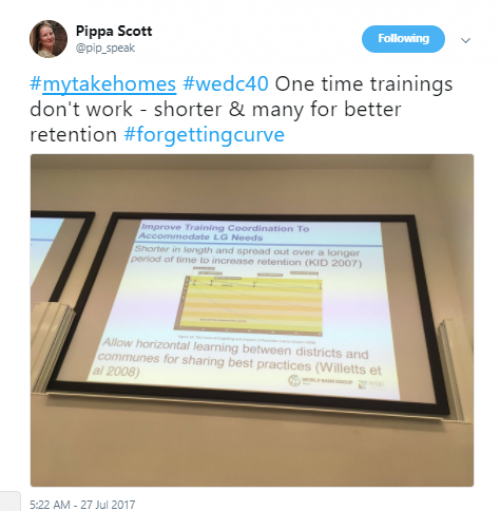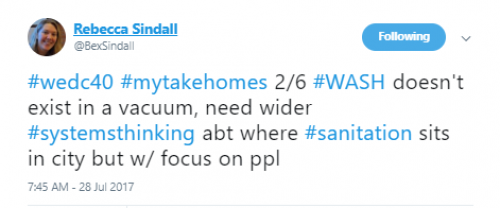At the 40th WEDC Conference last week, it was all about new takes on old ideas.
Published on: 01/08/2017
I attended the WEDC Conference that was celebrating its 40th anniversary, this year taking place at its home in the British town of Loughborough. Besides an excuse for birthday cake, major anniversaries often inspire us to reflect on the past and consider the path we have taken in order to arrive at our present position. Birthdays are an opportunity to articulate lessons that are often only revealed in hindsight, and to intentionally transform 'experience' into 'wisdom'; making us better prepared to work toward goals for the future.

In honour of the 40th event #WEDC40, the WEDC team made a sector timeline going back to 1953, the year in which the UNICEF executive board first approved entry into the Water and Sanitation sector. While looking back on critical developments and sector milestones of the past, many participants came to the same conclusion I did: significant progress has been made and many of the crucial factors needed to improve the WASH situation around the world have been identified.
However, it's also clear that we currently struggle with understanding how to operationalise what we have learned from past failures and past triumphs. A persistent theme at #WEDC40 was that the current challenges are to more effectively use data and evidence to refine existing approaches, to stop using approaches that don't work, and to better integrate global efforts using big-picture systems thinking to better leverage piecemeal investments and individual programmes.

Three key topics stood out as new takes on old ideas: Capacity development, integrated approaches to sanitation, and data usage. Each of these themes will require improved documentation of past and current efforts and a more strategic use of data for both advocacy and adaptive programme management.
WASH service delivery takes place in a complex socio-technical system, meaning that people and their behaviours, decisions, and actions are important at every step. Capacity development therefore plays (or should play) at least a minor role in most WASH programmes to promote sustainability of gains made during a project. Although one-off trainings or stand-alone capacity building programmes have done some good over the years, most practitioners agree that there is a persistent capacity gap across different areas of the sector.
We struggle to achieve lasting impact due to staff-turnover and the reality that people forget things over time, known as the #forgettingcurve. One study presented by the World Bank Water and Sanitation Program showed how 'low-dose high-frequency' trainings may be an excellent way to mitigate this challenge. The need for ongoing and routine training rather than large one-off events can be supported by integrating training and capacity building programmes into local and national government, university, and professional development structures. There is no need to re-invent the capacity building wheel, but several sessions on the topic at #WEDC40 suggested that it is time to learn from decades of evidence and start rolling the wheel more effectively.

The last few years have shown a transition in the sanitation sector, particularly in the shift from MDG language focusing on access to improved sanitation (via toilet provision) toward the SDG definition of safely managed services (including what happens after the toilet is there) . The emergence of faecal sludge management (FSM) mapping tools, such as IRC's faecal waste flow calculator and the SuSanA Shit Flow Diagram, have demonstrated a systems thinking approach that considers the entire cycle of what happens to waste as it is captured, contained, transported, treated, and reused or disposed of in the environment (known as the sanitation chain). While this has been a significant advancement, Dr. Pippa Scott reminded us that people and behaviour are involved at every step of the way. We agree Pippa!


Other approaches such as Community Led Total Sanitation (CLTS) and Sanitation Marketing have placed a significant emphasis on human behaviour in stimulating demand and use of sanitation facilities. Both have had significant impact on the sector in recent years but have also faced broad challenges that point to the need for more constructive learning going forward. Lessons from FSM, CLTS, and sanitation marketing are relevant for meeting SDG6, and there is a need to openly communicate challenges and failures from each in order to inform future iterations of these approaches. The challenge is not a need for innovation per se, but instead in moving away from business as usual and using a more holistic approach that leverages successes and does not aim to oversimplify with a one-size-fits-all strategy. These elements and tools can all be integrated into a systems approach.

Evidenced by the 2015 naming of the SWA collaborative behaviours, today's global WASH conversation is focused on using, supporting, and building local and national systems for sector processes. Gone are the days when NGOs and academics were collecting data on programmes, brought them home to study and lock in journals. Process documentation and monitoring are not new ideas, but the way this information is shared and used is changing.


Supported by developments in ICT (Information and Communication Technology), national monitoring systems are improving. There is a need to develop and improve data management protocols and to establish clear processes for how to use that data for planning and decision making. Meeting the SDGs means reaching everyone, everywhere, and this is not something that will be achieved by NGOs alone. Two side-sessions by IRC and Agenda for Change partners addressed the need to improve frameworks for partnering with local government and assure that NGO efforts and monitoring processes support local systems rather than supplant them.
With improvements in ICT and widespread smartphone availability, collecting data is easier than ever. It is essential that quality is not lost to quantity and that feedback loops are in place to understand the demand for data so that it can be analysed and presented in a useful way.


While new technologies and innovations may be important, meeting the SDGs will require a significant improvement in our way of working more broadly. We are armed with tools and tips and resources, but in order to escape a business as usual approach it is essential that we stop and reflect on over 50 years of experiences in WASH so that we can learn from failures and successes. We need to improve documentation processes and evidence-generation so we can better understand what works and what doesn't. It remains essential to be a "Learning Sector" that reflects collectively both at the global and local level because to reach everyone we must accept that we are in it for the long haul. In the words of Mark Harvey talking about fragile states but with broader implications , "Don't just do something, stand there."

Note: Thank you to the #WEDC40 Twitter community who brought the conversation to people around the world and took the notes for this article! @BexSindall @Dani_Barrington @Johnwsauer @darrens200368 @elshaylor @pip_speak @thewatercyclist @kristin_ravndal and many others.
At IRC we have strong opinions and we value honest and frank discussion, so you won't be surprised to hear that not all the opinions on this site represent our official policy.